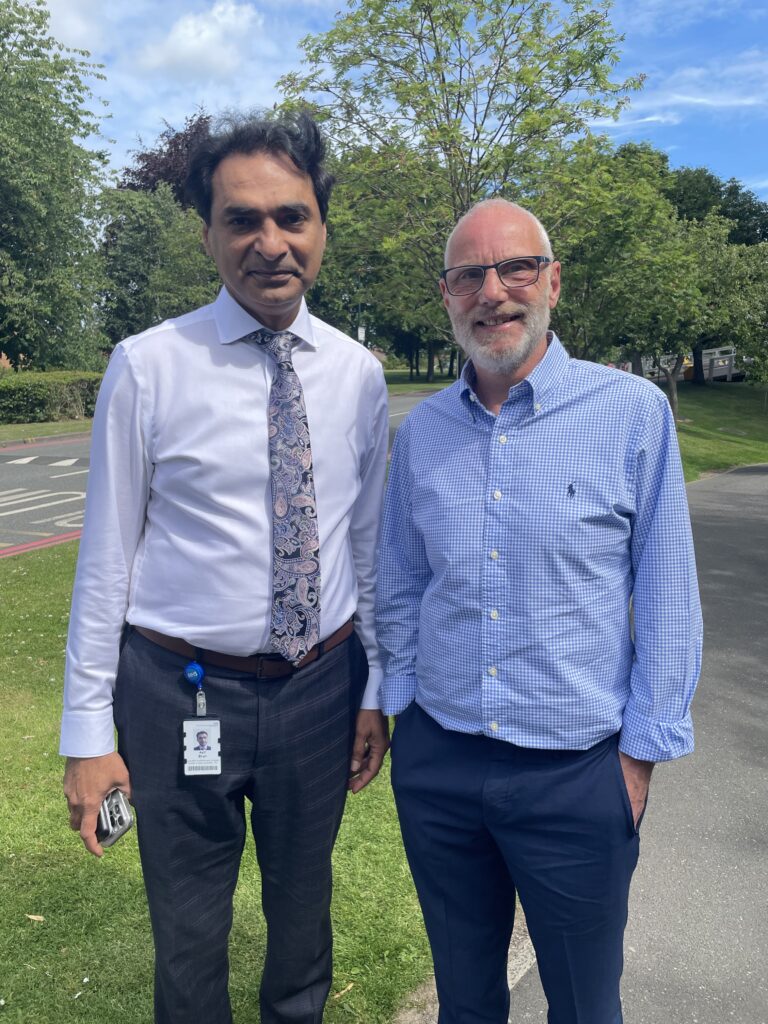Clinicians in Newcastle have performed the Freeman Hospital’s first minimally invasive mitral valve surgery – a pioneering procedure to fix a leaking heart valve without the need for opening the full chest.
The mitral valve is one of the four heart valves that control the flow of blood in and out of the heart. It separates the upper left heart chamber from the lower left heart chamber and has two flaps, which open to let blood flow and then close to stop blood travelling backwards into the heart.
Mitral regurgitation occurs when the mitral valve collapses and fails to close properly. As a result, blood flows backwards through the valve when the heart contracts, compromising the function of the heart. The condition can cause breathlessness, fatigue, dizziness, chest pain and, if left untreated, can lead to heart failure and death.
Repairing a leaking mitral valve usually requires open-heart surgery, which involves making a large incision in the chest and dividing the breastbone. This is known as a sternotomy and typically leaves a 20–30 cm scar on the chest. Patients also require the support of a cardiopulmonary bypass – commonly known as a heart-lung machine – so the operation can take place while the heart is not beating.
With the state-of-the-art, minimally invasive procedure, a small 5 cm incision is made on the right side of the patient’s chest. The surgeon then uses specialised instruments through this small incision to reach the heart chamber and repair the valve, using a tiny high definition camera to guide the procedure. The patient is also placed on the heart-lung bypass machine through the groin with a small 2 cm incision. This method can offer a number of benefits for patients, including a faster recovery, less pain, a smaller scar and returning back to normal routine life much sooner (after 2 weeks as compared to conventional surgery takes 6-8 weeks for full recovery).
Mr Asif Shah, Consultant Cardiothoracic and Heart/Lung Transplant Surgeon at Newcastle Hospitals, performed the new technique for the first time in Newcastle. He said: “This is a major step forward for our cardiac surgery programme and for patients having surgery here. By using minimally invasive techniques, we can offer quicker recovery times, less postoperative discomfort, and reduced risk of infection – all without compromising on the safety and effectiveness of the valve repair procedure.”
Stephen White, 65, from Hetton-le-Hole, became the first patient at the Freeman to undergo the minimally invasive mitral valve repair. A former factory General Manager, Stephen was diagnosed with a heart murmur as a child after experiencing dizzy spells. The condition was monitored throughout his life, but in recent years he began to feel increasingly tired and unwell.
“I’ve always loved walking, but I was starting to get really tired, and the dizziness came back,” said Stephen. “Eventually I was told I’d need surgery.”
Stephen took the opportunity to have the new minimally invasive procedure and describes the experience as lifechanging. He said: “I’d never been in hospital before, and I was nervous – but the whole thing was seamless.
“I had the procedure on a Thursday and was home by the following Tuesday. There was no pain afterwards, and I couldn’t believe how quickly I recovered. The care I received from everyone – surgeons, nurses, physios, support staff – was just fantastic.”
Since the surgery, Stephen says his symptoms have reduced, and he’s regained confidence to get back to the activities he enjoys most.

“I feel like I’ve got a new lease of life. I’m back out walking the dogs, enjoying life without feeling anxious. I can’t thank the team enough – their professionalism, teamwork and kindness were second to none.”
The successful introduction of this advanced surgical technique at the Freeman Hospital means more patients will now have access to less invasive options for life-saving heart procedures in the North East.
